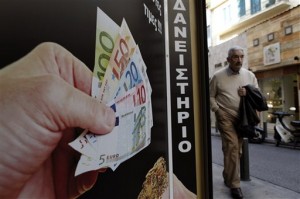Eurozone crisis may disrupt Asia’s growth momentum

A man walks past one of the many pawn shops that have opened in debt-crippled Greece over the past three years in central Athens on Nov. 26, 2012. The Philippines and other economies in the Asia-Pacific will definitely expand next year but way below their growth potential because of the ongoing crisis in the eurozone. AP PHOTO/PETROS GIANNAKOURIS
MANILA, Philippines—The Philippines and other economies in the Asia-Pacific will definitely expand next year but way below their growth potential because of the ongoing crisis in the eurozone.
Moody’s Analytics said that in 2013 strong domestic demand, appropriate economic policies and improving investor confidence would fuel the expansion of Asia-Pacific countries.
But anemic export revenues, brought on by the problems in Europe, would put a dent on Asia’s growth momentum.
“Asia-Pacific economies head into 2013 growing solidly, but below their long-term potential rates,” Moody’s Analytics said in a report authored by one of its economists, Glenn Levine.
“Corporates are in good shape and credit markets are functioning well. Yet GDP growth will not reach potential rates until the second half of the year, leaving full-year 2013 growth slightly below trend.”
In the case of the Philippines, Moody’s Analytics expects the domestic economy to grow by about 5 percent, slowing down from this year’s expansion rate.
In the first three quarters of the year, the Philippine economy grew by 6.5 percent, registering one of the fastest growth rates in the region during the period.
Moody’s Analytics said the Philippines and its neighbors could grow faster in 2013 were it not for the drag caused by the eurozone crisis.
Asia-Pacific countries, it said, continue to rely significantly on the eurozone for their export earnings. But for some countries like the Philippines, trade with Europe had declined over the years.
Exports to the eurozone currently account for 10 percent of the Philippines’ total export revenues—down from about 14 percent of the last few years.
Should the unfavorable economic situation in the eurozone worsen, Moody’s Analytics said, growth of Asia-Pacific countries would be dampened if not stalled.
“The biggest risk to Asia comes from Europe, where the sovereign debt crisis remains unresolved. European policymakers are likely to muddle through, but a severe downside event remains a distinct possibility, particularly with elections coming in key markets,” Moody’s Analytics said.
The impact on the Philippines and its neighbors will be in the form of weaker exports, lower foreign direct investments, drop in export financing and worsening domestic sentiment, it added.
A growth rate in the 5-percent territory will be much faster than projections for most advanced economies, but this will not be enough to help reduce poverty in the Philippines, local economists say.
They add that the Philippines should grow by at least 7 percent a year over the medium term to trim poverty incidence.
